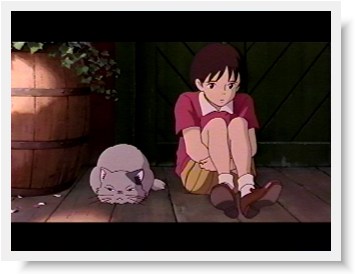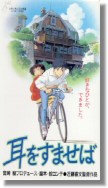![]()


Mimi o Sumaseba
(Whisper of the Heart)
Copyright: © 1995 Studio Ghibli / Tokuma Shoten Publishing / NTV Broadcasting
Length: 111 minutes
Genre: romance / drama
Rating: G, suitable for family viewing
Format: Original Japanese Dialog (VHS/LD)
Original Story: Hiragi Aoi Producer: Suzuki Toshio Screenplay by: Miyazaki Hayao Directed by: Kondo Yoshifume
![]()
Suitable for Family Viewing - No violence at all, no nudity, no sex, and no foul language. The entire movie is about a young teen-ager growing up, and the turmoils she faces with relationships and preparing for adulthood. May not capture the attention of children.
![]()

9th grade Tsukishima Shizuku loves to read books. Especially fantasy books. So much so, that during her summer break, she has set out to read twenty books over the holidays. But Shizuku finds something disturbing about the books she's been reading: In each of the check-out cards, she sees the same name -- Amasawa Seiji. Who is this boy? And as if there weren't enough pressures of doing well at school, Shizuku also begins to realise that she's no longer a little girl anymore. While following a wandering cat travelling on the train, she finds herself in an upscale neighbourhood, which houses a most unusual European curio shop. And inside is a most unusual doll of a aristocratic cat, with eyes that captivate her imagination. With that, she finds herself embarking on a voyage of self-discovery, and confronting the difficulties of her approaching adulthood: thoughts of her yet to be decided career goals, and perhaps even love...
![]()
![[Country roads... take me home...]](m001_001.jpg) ![[A stranger is reading Shizuku's book.]](m001_002.jpg) ![[Nothing like getting home, only to be yelled at by your older sister.]](m001_003.jpg) ![[Danshaku (Baron), the magical cat-statue.]](m001_004.jpg) ![[]](m001_005.jpg) ![[Seiji tracks down a somewhat embarrassed Shizuku...]](m001_006.jpg) ![[Shizuku discovers the connection between the books, Seiji and now her school.]](m001_007.jpg) ![[The love triangle gets a bit complicated as Sugimura admits his feelings for Shizuku.]](m001_008.jpg) ![[Seiji, the apprentice violin-maker, plays a song for Shizuku on one of his own creations.]](m001_009.jpg)
|
I know I'm going to get some flak over this review. Mimi o Sumaseba is a cute, innocent 'coming of age' story involving 9th-grade Tsukishima Shizuku, and her growing affections for fellow student and upcoming violin maker, Amasawa Seiji. The movie has a great pedigree: produced by the veneral Studio Ghibli, screenplay written by Miyazaki Hayao, and directed by the late Kondo Yoshifumi. It tries to capture the same sense of self-discovery as Ghibli's previous work, Omoide Poro Poro. But in my mind, the movie isn't quite up to the high standards set by other Ghibli works. Part of the problem lies with my interpretation of what is motivating the characters -- specifically, Shizuku's impetus for writing the fictional account of Danshaku ('Baron' in Japanese), the cat-doll that has so enthralled our young heroine. But is it enough for her to risk her school grades and all else? That aside, the real story has nothing to do with her secondary interests; rather it's about Shizuku growing up. She's a young girl who has never really thought about what she wanted out of life, and is now realising that it's something she must eventually face. Part of this involves Seiji, who not only becomes Shizuku's first romantic interest, but his determination in learning to become a master violin maker in Italy also serves to inspire her to write her first full-length story. It's the interaction between Shizuku and her friends which brings this story to life. The complicated rituals and twists involving Yuko's receipt of a love letter, and the subsequent discovery that the love letter's facilitator (Sugimura) is the object of Yuko's affections is further complicated by the revelation that Sugimura is in fact in love with Shizuku. Sound complicated? Maybe, but the way all this comes out is a wonderfully amusing scene, with a refreshingly candid approach and resolution not often seen in anime. Technically, this movie is a mixed bag. Background paintings are again well-drawn but overall, the animation was on par with a good OAV, and not as smooth as we've come to expect from Ghibli. There's even some obvious recycling of outlines, as when we see Shizuku climbing up the path when she first discovers Nishi's curio shop, and then again as she's climbing stairs for her third trip. The image is mirrored, and cells are filled differently, but it's basically from the same stock. The soundtrack was a little odd as well, a mix of acoustic and synthesized pieces. Whie the compositions were fine and immimently listenable, the mixing was not up to par, either. For some reason, the sound levels for the synthesized pieces were a couple of notches too high, making their presence more annoying than constructive. The acting is better than average, but again, I felt that Shizuku's main motivation behind her story just wasn't believeable. Even with these weaknesses, it's still a far better product that most of the run-of-the-mill stuff we seem to be flooded with these days. As with previous Ghibli works, this film has its share of its inside jokes as well. Watch Danshaku closely throughout this movie, and in particular, in the scene in which Nishi explains to Shizuku the real story behind this doll. Is the animation staff playing games with us? (Also, there's this matter with all the 'Keio' ads on the buildings, and the 'Keio' train station. I'm not quite sure what the significance of this is, perhaps someone who is familiar with this area could explain this to us...) But perhaps Miyazaki's most poigniant in-joke isn't a joke at all: the ironic wording in the parody translation of 'Country Roads' once again shows his concern for the environment, and once again, his method of sharing this ideology is highly effective. Tired of raucous robots, big-busted babes and gigantic gatling guns? You just might find this a refreshing change. |
![]()
| Original: | Subbed: | Dubbed: | |
|---|---|---|---|
| Story: | N/A | N/A | |
| Direction: | N/A | N/A | |
| Acting: | N/A | N/A | |
| Animation: | N/A | N/A | |
| Music: | N/A | N/A | |
| Translation: | N/A | N/A | N/A |
| Overall Rating: | N/A | N/A |
![]()
![]()
- Whisper of the Heart at Nausicaa.net
[ home ]
[ what's new ]
[ café contest ]
[ café reviews ]
[ parent's guide ]
[ encyclopædia ]
[ café trivia ]
[ café latté ]
[ café espresso ]
[ about the café ]
[ feedback ]
[ links ]
[ site map ]
© 1997-2000. All rights reserved. The Animé Café logo and the Crystal Kyoko award are original creations of the Animé Café. Please do not use any of the materials on this site without the expressed written permission of the Animé Café.
Page last modified 1999.10.24
